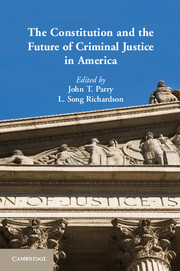The Constitution and the Future of Criminal Justice in America
Coordonnateurs : Parry John T., Richardson L. Song

L. Song Richardson is Professor of Law at the University of Iowa College of Law. Her legal career includes work as a state and federal public defender, as an assistant counsel at the NAACP Legal Defense Fund representing capital defendants in habeas cases, and as a partner in a boutique criminal law firm. She is a member of the American Law Institute. Her research explores the legal implications of mind sciences research on criminal procedure, criminal law and policing. Her work has been published by law journals at Yale, Berkeley, Duke, Northwestern and Cornell, among others.
Date de parution : 08-2013
Ouvrage de 348 p.
15.2x22.9 cm
Disponible chez l'éditeur (délai d'approvisionnement : 14 jours).
Prix indicatif 32,87 €
Ajouter au panierDate de parution : 08-2013
Ouvrage de 246 p.
15.6x23.5 cm
Disponible chez l'éditeur (délai d'approvisionnement : 14 jours).
Prix indicatif 101,82 €
Ajouter au panier


